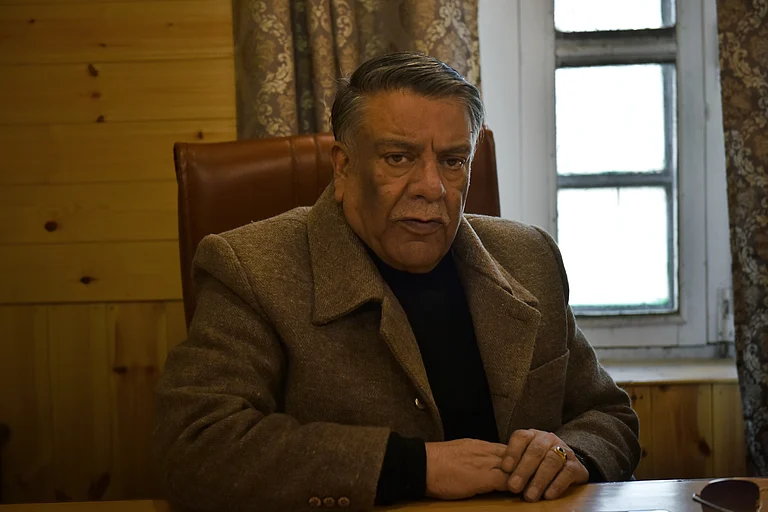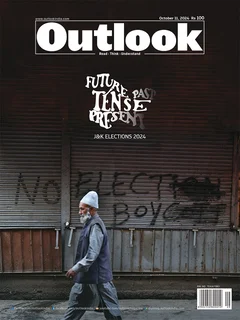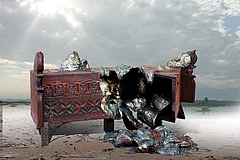This story was published as part of Outlook Magazine's 'Future Tense' issue, dated October 11, 2024. To read more stories from the Issue, click here.
As Iltija Mufti cast her vote on September 18 and returned to her vehicle, she emerged from the sunroof of her car and chanted, “Zoon Ho, Zoon Ho”, which means “It is the moon, it is the moon”. But it was a sunny day and there was no sighting of the moon. What she intended to convey was “Zeun Ho, Zeun Ho” (We won, we won).
While the mispronunciation of Kashmiri words by Iltija and her mother—former Chief Minister Mehbooba Mufti—has drawn widespread attention in this election, their campaign has reinforced the importance of the Kashmiri language as an integral part of the region’s identity. “Our fight is all about identity. If we abandon the Kashmiri language, where will we end up? We must teach our children Kashmiri,” says Mehbooba, who is also the president of the Peoples Democratic Party (PDP).
In Bijbehara, as in much of Kashmir, young voters are least concerned about Iltija’s Kashmiri pronunciation. Mispronunciation of Kashmiri words by Iltija is often seen as a source of amusement rather than a slight against the language.
Bijbehara constituency, from where Iltija is contesting, holds special significance as it is the hometown of her mother. Iltija’s grandfather, Mufti Mohammad Sayeed, was raised here and started his political career from the region. Iltija is contesting against Bashir Ahmad Veeri, a leader from the National Conference (NC).
The competition, however, has been tough.
The ancient town of Bijbehara bears a striking resemblance to the old city of Srinagar. Located on the banks of the Jhelum River, it is encircled by four plateaus, creating a beautiful setting. Much like Srinagar’s old city, Bijbehara features a labyrinth of narrow lanes and by-lanes filled with shops offering a wide array of goods—from copperware to fragrant spices. The town also has numerous bakery shops, attracting travellers headed to south Kashmir or Srinagar.
The town has remained the PDP’s political nerve centre for long. Much before 1999, when Mufti formed the PDP, Mehbooba started her political career from Bijbehara in 1996. She is a law graduate from the University of Kashmir and her father was in the Congress party then. In 1996, when militancy was at its peak in the Valley, many were reluctant to fight elections. Mufti convinced his wife Gulshan Begum to contest the election from Pahalgam constituency and his daughter to run from Bijbehara. Mehbooba won the election but her mother lost. Even after winning the polls in 1996, Mehbooba would go to village after village with the PDP’s agenda, which analysts would later describe as “soft separatism”. Gradually, within four years, the PDP was seen as an alternative to the grand old party, the NC. In the 2002 elections, the PDP won 16 seats and with the support of the Congress, it formed the government with Mufti as the chief minister.
In 2008, it was widely seen as Mehbooba’s decision to pull out from the Congress-led Ghulam Nabi Azad government after several killings in Kashmir allegedly at the hands of security forces during mass agitations against the transfer of land to the Amarnath Shrine Board. The party increased its tally in the state assembly election held in October 2008, but couldn’t form the government. In the next six years, Jammu and Kashmir saw the NC Vice President Omar Abdullah as the chief minister and Mehbooba his vociferous opponent.
In the 2014 elections, the PDP secured 28 seats and became the single-largest party. The NC was reduced to 15 seats. It was all because of Mehbooba and her relentless campaign.
In 2015, after much negotiation, the PDP entered into an alliance with the Bharatiya Janata Party (BJP) to form the government with Mufti as the chief minister. The party had fought the elections to keep the BJP at bay. But it ended up forming the government with the BJP. The alliance initially took off on a good note, but soon inherent contradictions between the alliance partners started surfacing. After the death of her father on January 7, 2016, Mehbooba was reluctant to become the chief minister of the PDP-BJP alliance government. She delayed the formation of the government for three months.
On April 4, 2016, Mehbooba was sworn in as the chief minister after a meeting with Prime Minister Narendra Modi, which helped restore the PDP-BJP alliance. But two months later, unrest erupted in Kashmir following the killing of a militant, Burhan Wani, on June 8, leading to accusations against security forces for the deaths of around 100 people. Mehbooba faced criticism as she blamed protesters for the violence. While the 2010 killings during Omar Abdullah’s tenure were largely forgotten, her 2016 statement lingered in public memory, impacting her political standing. Two years later, in June 2018, the PDP-BJP government fell after the BJP withdrew support.
Much has changed in Jammu and Kashmir since August 5, 2019, when the BJP government abrogated Article 370 and downgraded Jammu and Kashmir to a Union Territory. However, the PDP continues to focus on the reopening of the Srinagar-Muzaffarabad Road and the “resolution of the Kashmir issue”.
Iltija is central to the PDP’s strategy to restore the party’s former image. She understands this well. “This election is crucial as it is taking place after 10 years,” Iltija told voters.
At Hassanpora village, the PDP had brought a popular Kashmiri band to create a festive atmosphere for her speech. The bandmaster, Ahil Raja, waved enthusiastically at Iltija, who returned the gesture. “I have over one lakh followers on Instagram,” said Raja, a crowd favourite known for his popularity among women. “I usually sing at weddings and don’t attend political events, but since she asked, I couldn’t say no,” he says.
For the past six years, Iltija has served as both a political and media advisor to her mother—raising issues like political prisoners, the arrest of her mother, and following up with the Supreme Court seeking her release.
On September 16, while campaigning for Iltija in Bijbehara, Mehbooba frequently reminded voters that they should support Iltija not just because she is her daughter, but also because she has been the “sole spokesperson” of Kashmir since the abrogation of Article 370. “Didn’t you see her speaking so boldly on TV, raising your concerns?” Mehbooba would say. She looks like a worried mother deeply aware that if Iltija loses the election, it would not only be a major setback to the Mufti clan after Mehbooba’s defeat in the parliamentary polls, but also to the PDP itself.
A former PDP leader says that while Mehbooba’s connection with the people distinguishes her from others, she hasn’t been kind to her loyalists who stood by her after the abrogation of Article 370. He says she relied on hearsay about them, despite their loyalty, which compelled them leave the party.
After the abrogation of Article 370, Iltija spoke about Kashmir on every major media platform. A graduate of Sri Venkateswara College, University of Delhi, with a degree in international relations from the Warwick University, she made appearances on CNN with Christiane Amanpour and on BBC’s HARDtalk. Following these interviews, Iltija claimed that her access to her mother had been restricted.
Before the abrogation of Article 370, Iltija was largely unknown in Kashmir. “I feel that people here have suffered so much and are deeply averse to politicians. I don’t think I can change this perception overnight,” says Iltija. “I don’t have delusions of becoming a mass leader.”
“Language is no barrier. In fact, people love me whenever I speak Kashmiri,” she says. At a roadshow in the Kangan area of north Kashmir on September 21, when her supporters started yelling Zoon Ho, Zoon Ho, Iltija, ever energetic in response, shouted back Zoon Ho, Zoon Ho. By now, Zoon Ho, Zoon Ho has become popular in the Kashmiri lexicon.
MORE FROM THIS ISSUE
Naseer Ganai in Bijbehara
(This appeared in the print as 'Zoon Ho, Zoon Ho')


































